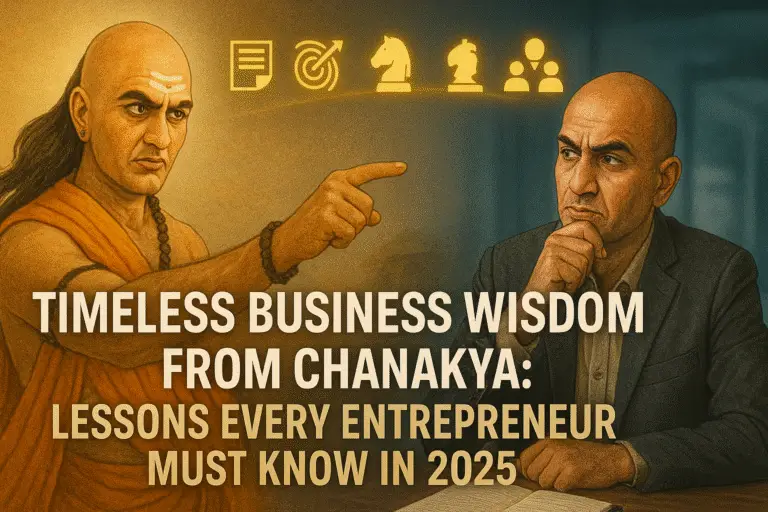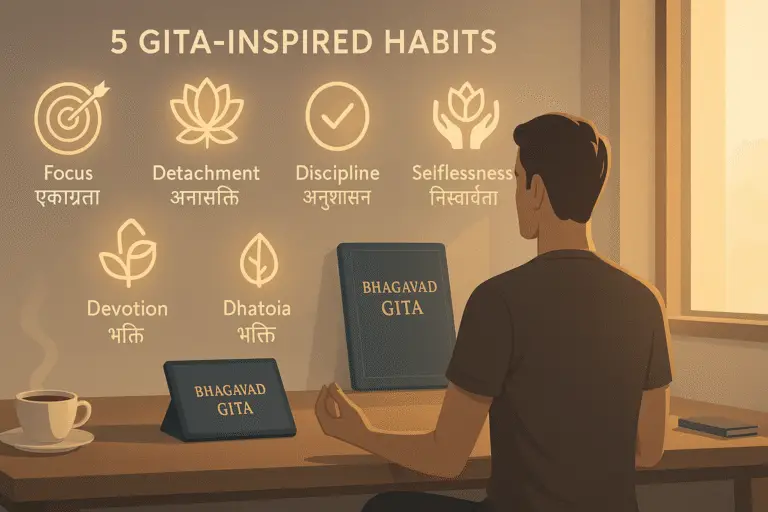7 Powerful Business Strategies from the Bhagavad Gita Every Entrepreneur Should Know

7 Powerful Business Strategies from the Bhagavad Gita Every Entrepreneur Should Know
Discover 7 timeless business strategies from the Bhagavad Gita that every modern entrepreneur should apply. Ancient wisdom meets today’s business world.
📑 Table of Contents
- Introduction: Ancient Wisdom, Modern Business
- Detachment from Results – Focus on Effort
- Clarity of Purpose – Know Your Dharma
- Calm in Crisis – Control Your Mind
- Leadership by Example – Be the Change
- Resilience – Rise Above Failures
- Team Harmony – Selfless Action for the Greater Good
- Strategic Thinking – Observe Before Acting
- Final Thoughts: Gita as a Timeless MBA
🧠 1. Introduction: Ancient Wisdom, Modern Business
The Bhagavad Gita, written over 5,000 years ago, is more than just a spiritual text. It’s a strategic guidebook for life, leadership, and decision-making. For modern entrepreneurs navigating uncertainty, competition, and chaos. its wisdom is more relevant than ever.
Let’s decode 7 business strategies hidden in this sacred text and how they can supercharge your growth mindset in 2025 and beyond.
Click Here :- Bhagavad Gita
🎯 2. Detachment from Results – Focus on Effort
“You have the right to work, but never to the fruit of work.” — Gita, Chapter 2, Verse 47
Business Application:
Stop obsessing over results like profit, fame, or user growth. Instead, focus on consistent, high-quality execution. Great entrepreneurs like Jeff Bezos or Ratan Tata built long-term empires by focusing on customer value, not just quarterly numbers.
👉 Let go of anxiety and concentrate on your systems, strategy, and service.
🔥 3. Clarity of Purpose – Know Your Dharma
“It is better to fail in your own duty than succeed in another’s.” — Gita, Chapter 3, Verse 35
Business Application:
Dharma is your purpose or inner calling. Whether you build a tech startup, a coaching platform, or a D2C brand—align it with your values and strengths.
🚀 Founders who understand their “why” stay more focused, resilient, and passionate. Your business should reflect who you are.
🧘♂️ 4. Calm in Crisis – Control Your Mind
“A person who is not disturbed by the incessant flow of desires can achieve peace.” — Gita, Chapter 2, Verse 70
Business Application:
In business, crises are inevitable — failed products, investor rejection, market crashes. The Gita teaches equanimity: stay balanced during both success and failure.
💡 Cultivate a CEO mindset that’s calm under pressure, makes clear decisions, and inspires trust.
Tip: Daily meditation or journaling can keep your mind centered.
👑 5. Leadership by Example – Be the Change
“Whatever a great man does, others follow.” — Gita, Chapter 3, Verse 21
Business Application:
As a founder or manager, your team mirrors your attitude, ethics, and energy. Be transparent, kind, disciplined — and your team will follow suit.
✅ Lead with vision, not fear. Build a team culture where trust and ownership thrive.
💪 6. Resilience – Rise Above Failures
“No effort in this world is wasted.” — Gita, Chapter 2, Verse 40
Business Application:
Entrepreneurship is a game of setbacks. Failed campaigns, fired employees, rejected funding—these are not wasted.
🧩 Every setback teaches something. Like Lord Krishna says, every sincere effort counts. Learn, adapt, and bounce back stronger.
Example: Jack Ma faced 30+ rejections before founding Alibaba.
🤝 7. Team Harmony – Selfless Action for the Greater Good
“Perform your duty equipoised, abandoning all attachment to success or failure.” — Gita, Chapter 2, Verse 48
Business Application:
Build teams that care not just about salary or credit—but about the mission. Encourage collaborative action, and reduce ego clashes.
💬 Foster a culture of shared responsibility, regular communication, and meaningful recognition.
🧠 8. Strategic Thinking – Observe Before Acting
“The wise see knowledge and action as one.” — Gita, Chapter 5, Verse 4
Business Application:
Don’t rush into decisions. Observe your market, analyze competitors, and then act with clear insight.
📊 Like Krishna guided Arjuna to pause and reflect before going to war, entrepreneurs must combine knowledge with action to win.
Use tools like:
- SWOT analysis
- Competitive intelligence
- MVP testing before scaling
🧘 Final Thoughts: Gita as a Timeless MBA
The Bhagavad Gita isn’t just a holy scripture. It’s a spiritual MBA—teaching mental clarity, ethical leadership, and long-term thinking.
In today’s cut-throat business world, these lessons offer balance, vision, and integrity. Entrepreneurs who build businesses with these principles aren’t just successful — they’re fulfilled.
More On Business :-
- Top 5 Skills Every Entrepreneur Must Learn in 2025
- How to Build a Scalable Business in 2025: Step-by-Step Guide for Long-Term Growth
- Top 10 Business Trends in 2025 That Will Define the Next Decade
- How AI Is Destroy Traditional Businesses in 2025: Opportunities & Challenges
- Top 7 Low Investment Business Ideas In 2025 : Be Rich








2 Comments